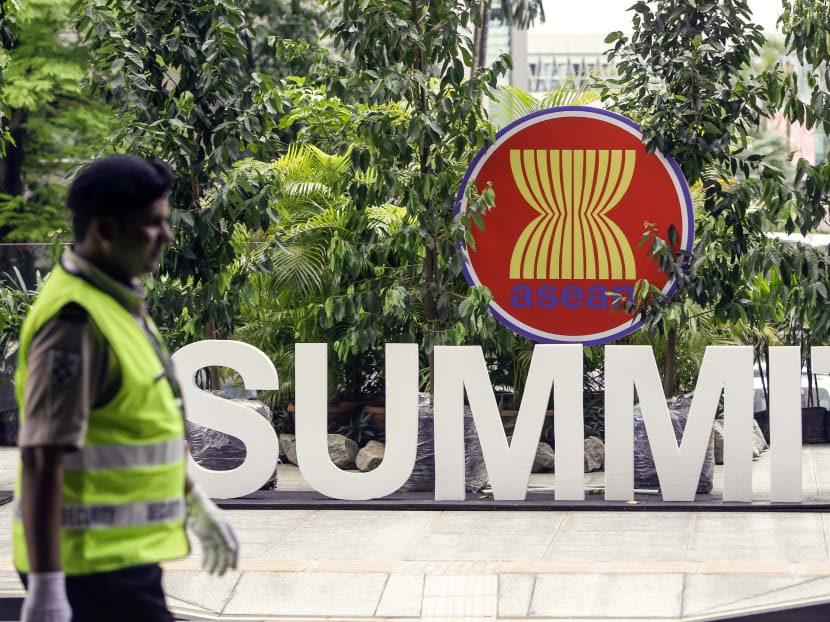More “difficult now for Asean to reach consensus”
By EILEEN NG

It has become more difficult for member states of the Association of South-east Asian Nations (Asean) to reach consensus on issues, and it is important for them to continue to strike a balance between national and regional interests, said Ambassador at Large Bilahari Kausikan. Photo: AP
SINGAPORE — It has become more difficult for member states of the Association of South-east Asian Nations (Asean) to reach consensus on issues, and it is important for them to continue to strike a balance between national and regional interests, said Ambassador at Large Bilahari Kausikan.
Noting that the greatest challenge to the regional grouping is from its internal dynamics, Mr Kausikan said the domestic politics of several Asean members have become more complicated, and this has in turn made their calculations of national interests more complex.
“With expansion, it has become more difficult to reach consensus. The Asean way has become more rigid. Not every new member has internalised the need to balance between national and regional interests,” he said at the Asean Roundtable 2017 organised by ISEAS - Yusof Ishak Institute.
Mr Kausikan was one of the panelist at the discussion held in conjunction with Asean 50th anniversary this year where he talked about Asean centrality and its implications in the region.
He cited how Cambodia, as Asean chairman in 2012, had prevented the grouping’s foreign ministers from issuing a joint communique for the first time in its history as the most “egregious example of the disregard of regional interest” by an Asean member.
Many believe Cambodia had done so because its ally China did not want Asean to be over critical over its actions in staking claims to the South China Sea.
After the incident, Asean has maintained a minimal consensus on South China Sea that does not entirely satisfy the United States, China or all member states, Mr Kausikan noted.
The South China Sea issue was one of the two examples that the former Permanent Secretary of the Foreign Affairs Ministry gave of attempts by major powers to capture the grouping without success.
The other was on member state Myanmar, where Western powers repeatedly tried to pressure or persuade Asean to adopt their approach towards the then military-ruled country.
Some Asean members were tempted to adopt at least some elements of the Western approach but failed to command consensus, he said.
“So, the very diversity of the national interests of member states make Asean difficult to capture in its entirety and that’s why incoherence is not always a bad thing. Paradoxically the limitations to Asean centrality keeps Asean central — at least minimally autonomous,” he added.
“Throughout its history Asean has frustrated all major powers in continually slipped from their grasp. Asean does not always get its way but neither have the major powers can entirely have their way either.”
Still, major powers consider Asean central not because of its strategic weight but because its relative strategic weakness makes it “an occasionally useful instrument to advance their national interests”, he noted.
“Asean suits the interests of the major powers. I do not think any major powers want to destroy or divide Asean.”
The biggest test for Asean will therefore be its ability to manage relations among its members.
“If you can’t manage relations among members, you certainly am not going to be central in any sense,” he said.
“Asean centrality is not one thing but many things. Centrality is a subtle shape-shifting concept, capable of continual adaptation. Asean can and will lose centrality only if we lose confidence in our own agency to make painful and difficult adjustments that will continue to be necessary.”
Also at the same forum, Dr Hoang Anh Tuan, the Vietnamese ambassador to Indonesia said Asean consensus and centrality go hand in hand.
“Asean consensus is crucial for centrality and vice-versa. Without centrality, Asean cannot maintain its consensus,” he said.
Citing the various claims to the South China Sea as an example, Dr Hoang said the issue affects regional security, stability and interests of various stakeholders.
“If Asean cannot maintain its unity and consensus, the grouping will be divided, weakened and gradually lose its centrality,” he said.
Speaking later in the day in a separate session at the forum, Malaysia’s former Minister for Foreign Affairs Syed Hamid Albar said that as Asean marked its 50th anniversary this year, it was time to relook its policy of non-interference in the internal affairs of other members.
“There is no way we can stick to the question of non-interference. We must look at what’s the collective interest, so I would like to revisit the (Asean) Charter,” he said in reference to the grouping’s institutional framework.
“Let’s us discuss. We do not want to interefere but there must be areas we can discuss to come to a better understanding.”






